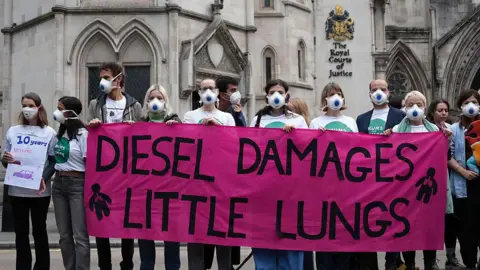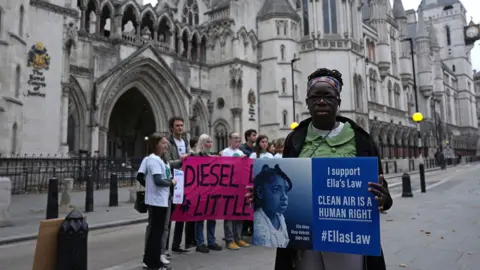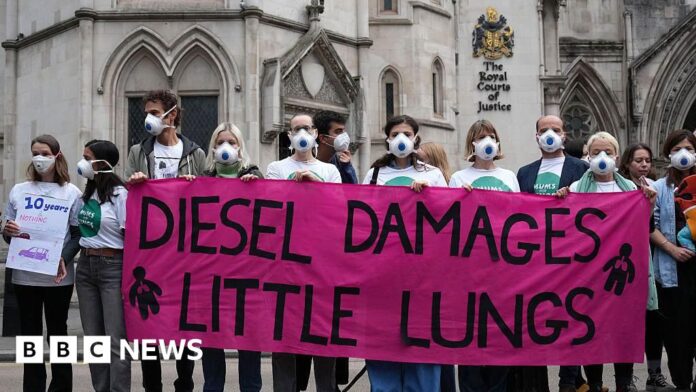Emer MoreauBusiness reporter and
Theo LeggettBusiness correspondent
 Getty Images
Getty ImagesA major lawsuit against five leading carmakers accused of cheating on emissions tests has opened at the High Court in London.
The trial is the latest chapter of what has become known as the “dieselgate” scandal, with the companies facing allegations they used illegal software to allow their cars to reduce emissions of harmful gases under test conditions.
The court heard on Monday that car manufacturers decided they would “rather cheat than comply with the law” over vehicle emissions.
The five carmakers – Mercedes, Ford, Peugeot/Citroën, Renault and Nissan – all deny the accusations.
Opening the trial, Thomas De La Mare KC, for the car owners, said that “each player in the industry basically took a conscious decision that customer convenience, which helped the industry sell more cars, was more important” than preventing pollution.
In his written submissions, Mr De La Mare cited a report from the Centre for Research on Energy and Clean Air which found that excess nitrogen oxide – the emission created by diesel engines – had caused 124,000 premature deaths and 98,000 new cases of asthma in children in the UK and Europe between 2009 and 2024.
But Alexander Antelme KC, for Renault, said in written submissions for trial that the allegation of cheating emissions tests was “without merit and untenable”.
“The features to which the claimants wrongly object are, in fact, appropriate and necessary elements of a well-designed diesel engine,” he wrote.
Neil Moody KC, for Ford, said in written submissions that the case was “scientifically illiterate” and “flawed on the facts and the law”.
“The inference seems to be of some sort of industry-wide conspiracy. The proposition need only be stated for it to be seen to be implausible.”
The dieselgate scandal first emerged in September 2015, when the US Environmental Protection Agency accused Volkswagen of installing software – known as “defeat devices” – on diesel cars to lower readings of the cars’ nitrogen oxide emissions.
This software recognised when cars were undergoing official emissions tests, and turned on systems designed to reduce their output of nitrogen dioxide, a gas which can cause respiratory problems.
But when the cars were used on the road, the systems were turned off, in order to improve performance. The net result was that cars produced significantly higher levels of pollution in everyday use than official figures suggested.
VW later admitted the defeat devices had been used deliberately to circumvent emissions tests in the US, and had been fitted to some 11 million cars worldwide. It paid out some £26bn in fines and compensation.
Lawyers say this case is the largest class action in English and Welsh legal history, and could eventually involve 1.6 million car owners.
The five companies were chosen by the court as lead defendants to be tried first as the case is so big. They have been accused by 880,000 car owners of misleading them over emissions tests.
But depending on the outcome of this case, nine other carmakers are facing similar claims.
In 2020, the High Court ruled that Volkswagen had used defeat devices in breach of European Union rules to pass emissions tests.
Volkswagen settled a class action out of court, paying £193m to 91,000 British motorists.
The company has so far paid out more than €32bn (£27.8bn) over the scandal, mostly in the US.
Gathered outside the High Court on Monday were campaign group Mums for Lungs, and Rosamund Adoo-Kissi-Debrah, whose nine-year-old daughter Ella was the first person in the UK to have to have air pollution listed as a cause of death when she passed away in 2013.
 Getty Images
Getty ImagesA judgement on the High Court case is not expected until summer 2026.
The companies involved have said the claims against them are without merit.
A spokesperson for Mercedes said the mechanisms used in tests were “justifiable from a technical and legal standpoint”.
Renault and Stellantis, which owns Peugeot and Citroen, said the vehicles it sold were compliant with regulations at the time.
Ford said the claims had “no merit” and Nissan said it was “committed to compliance in all markets in which we operate”.
The main trial before Lady Justice Cockerill is due to conclude in December, but legal arguments will not be heard until March 2026.





